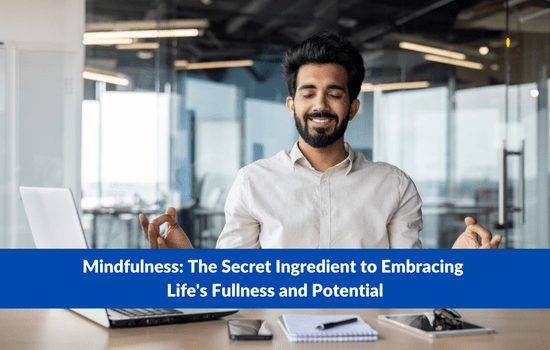Mindfulness helps us understand ourselves and develop our emotional intelligence. A mindful existence is one of the most important aspects of living a full, meaningful, and joy-filled life. It’s more than just a calming practice; it’s a way of life that nurtures self-awareness, strengthens relationships, and invites us to live more fully in the present moment. When we embrace mindfulness, we open the door to greater clarity, deeper connections, and a lasting sense of inner peace.
Living Fully Present: Exploring Mindfulness as a Key Aspect of a Rich Life

“The present moment is filled with joy and happiness. If you are attentive, you will see it.” - Thich Nhat Hanh
What is Mindfulness?
Mindfulness is the act of paying attention, observing, and experiencing life as it unfolds, including both its positive and challenging aspects. It invites us to notice our thoughts, emotions, surroundings, and interactions with openness and curiosity.
It can be practiced in the simplest moments, while brushing your teeth, driving your car, or engaging in a conversation. At its core, mindfulness is about intentional focus, self-awareness, compassion, and patience.
The Rewards of Regularly Practising Mindfulness
A regular mindfulness practice serves as a powerful antidote to distraction, stress, and emotional overload. It enables us to navigate life with greater intention and balance. The ongoing practice of mindfulness enhances our emotional intelligence, allowing us to understand and manage our emotions, as well as relate to others with empathy and care.
Here are some key benefits:
-
More clarity in your thinking, helping you make better decisions and solve problems with emotional awareness.
-
Deeper meaning and joy in your relationships, fueled by more engaged listening and connection.
-
Improved emotional regulation, with increased compassion for yourself and others.
-
Heightened self-awareness, resilience, and calm, leading to a more balanced life.
-
Improved physical and mental health, contributing to sustained inner peace.
Staying Present and Choosing a Lifestyle of Mindfulness
When I share with clients that we have approximately 50,000 thoughts a day, they’re often astonished. Choosing which thoughts to act upon—and which to let pass—is an incredible challenge. Research from Harvard even shows that people spend nearly 47% of their waking hours thinking about something other than what they’re doing. This mental drift is directly linked to lower happiness (Killingsworth & Gilbert, 2010).
Daily distractions can hijack our thoughts and emotions. But practicing mindfulness helps us anchor ourselves in the present moment, allowing us to approach challenges with calm, resilience, and purpose.
How to Practice Mindfulness Daily
You don’t need hours of spare time or a meditation cushion to cultivate mindfulness. Small, simple actions can bring your awareness back to the present moment and improve your sense of control and connection.
Everyday Mindfulness Practices:
-
Mindful Breathing (1–2 minutes): Pause and notice your breath anytime you feel stressed. Try this Box Breathing technique.
-
The 5-4-3-2-1 Grounding Technique: A simple sensory awareness tool to bring you back to the present moment.
-
Mindful Eating: Pay close attention to the texture, flavour, and experience of your food.
-
Tech Breaks: Pause and look out a window or do a short body scan instead of reaching for your phone.
-
Gratitude Journaling: Write down three things you're grateful for each evening.
These small acts promote inner peace and help reinforce self-awareness over time. My third book, The Mindful Journal, is a transformative guide that offers 115 days of self-discovery through daily prompts, unlocking emotional intelligence and fostering personal growth and self-awareness.
Mindfulness at Work Practices
-
Start meetings with a moment of silence to reset.
-
Practice active listening and pause before responding.
-
Take mindful breaks: a quick walk or stretch without checking your phone.
Practicing mindfulness at work improves focus, teamwork, and overall emotional intelligence.
Mindfulness Relationships Practices
-
Tune into your loved ones, watch their tone, expressions, and body language.
-
Use empathy and curiosity over reaction during tough conversations.
-
Express appreciation mindfully and often.
Bringing mindfulness into your relationships fosters trust, reduces conflict, and deepens emotional connection.
Mindfulness Through Meditation
“Mindfulness isn’t difficult. We just need to remember to do it.” - Sharon Salzberg
We can achieve mindfulness through meditation, which is defined as contemplation, thinking, reflection, or deliberation. The feeling of deep peace occurs when our minds are calm and silent.
One of the most accessible gateways to mindfulness is meditation. It’s the practice of quiet reflection that helps calm the mind and cultivate clarity, patience, and a sense of presence. Through meditation, we create space for self-awareness and often experience a powerful sense of inner peace.
Some find that meditation helps improve sleep or transitions between demanding roles, like shifting from work mode to parenting or from a tense meeting to a meaningful conversation. Let’s view meditation not as an occasional escape, but as a regular, intentional strategy—part of a well-oiled routine for emotional clarity and resilience.
However, you choose to integrate mindfulness into your day, whether through breathing, reflection, or mindful action, you will experience greater alignment between your inner world and outer experiences. Mindfulness enhances your emotional intelligence, cultivates your self-awareness, and enables you to live with greater clarity and joy in the present moment. And with that, you’ll unlock more meaningful connections and a lasting sense of inner peace. To dive deeper into this topic and learn how to make the most of your emotional energy, check out my book: The Power of Emotion.
This article was originally published on September 7, 2019, and has been updated (June 2025).
More Motivational Reads Here »
How Emotionally Intelligent Are You?
Sign up for Linda’s monthly tips to build your Emotional Intelligence and reduce Emotional Hijacking!

















